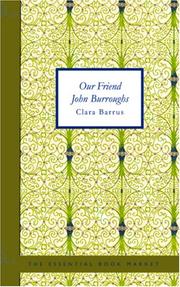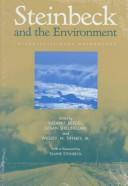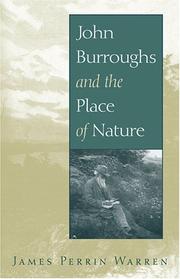| Listing 1 - 8 of 8 |
Sort by
|

ISBN: 1281833169 9786611833169 1426449445 Year: 2006 Publisher: [S.l.] : BiblioBazaar,
Abstract | Keywords | Export | Availability | Bookmark
 Loading...
Loading...Choose an application
- Reference Manager
- EndNote
- RefWorks (Direct export to RefWorks)
Book
ISBN: 0665717997 Year: 1919 Publisher: Toronto : W.J. Gage,
Abstract | Keywords | Export | Availability | Bookmark
 Loading...
Loading...Choose an application
- Reference Manager
- EndNote
- RefWorks (Direct export to RefWorks)
Natural history --- Livres de nature. --- Outdoor books. --- Burroughs, John, --- Burroughs, John,
Book
ISBN: 1443810835 9781443810838 1847184871 9781847184870 Year: 2008 Publisher: Newcastle Cambridge Scholars
Abstract | Keywords | Export | Availability | Bookmark
 Loading...
Loading...Choose an application
- Reference Manager
- EndNote
- RefWorks (Direct export to RefWorks)
At the time of his death in 1921, John Burroughs (1837-1921) was America's most beloved nature writer, a best-selling author whose friends and admirers included Walt Whitman, Theodore Roosevelt, John Muir, Henry Ford, and Thomas Edison. Burroughs was second only to Emerson in fostering the nature study movement of the nineteenth- century, and the popularity of his work inspired Houghton Mifflin to publish or reissue the work of numerous other nature writers, including that of Thoreau and Mui...
Natural history literature --- Nature literature --- Scientific literature --- Natural history --- Burroughs, John, --- Criticism and interpretation
Book
ISBN: 1324000333 Year: 2023 Publisher: : W. W. Norton & Company, Incorporated,
Abstract | Keywords | Export | Availability | Bookmark
 Loading...
Loading...Choose an application
- Reference Manager
- EndNote
- RefWorks (Direct export to RefWorks)
"The epic road trips-and surprising friendship-of John Burroughs, nineteenth-century naturalist, and Henry Ford and Thomas Edison, inventors of the modern age"--
Automobile travel --- History --- Burroughs, John, --- Ford, Henry, --- Edison, Thomas A. --- Travel --- United States --- Description and travel.

ISBN: 0817308466 0817354875 0817381651 Year: 1997 Publisher: Tuscaloosa ; London University of Alabama Press
Abstract | Keywords | Export | Availability | Bookmark
 Loading...
Loading...Choose an application
- Reference Manager
- EndNote
- RefWorks (Direct export to RefWorks)
Steinbeck, John --- Knowledge --- Science --- Nature --- Human ecology in literature --- Environmental protection in literature --- Burroughs, John --- Criticism and interpretation --- Melville, Herman --- Journeys --- United States
Book
ISBN: 0486821331 0486812545 Year: 2017 Publisher: Mineola, New York : Dover Publications, Inc.,
Abstract | Keywords | Export | Availability | Bookmark
 Loading...
Loading...Choose an application
- Reference Manager
- EndNote
- RefWorks (Direct export to RefWorks)
"This little volume really needs no introduction; the two sketches of which it is made explain and, I hope, justify themselves. But there is one phase of the President's many-sided character upon which I should like to lay special emphasis, namely, his natural history bent and knowledge. Amid all his absorbing interests and masterful activities in other fields, his interest and his authority in practical natural history are by no means at least. I long ago had very direct proof of this statement. In some of my English sketches, following a visit to that island in 1882, I had, rather by implication than by positive statement, inclined to the opinion that the European forms of animal life were, as a rule, larger and more hardy and prolific than the corresponding forms in this country. Roosevelt could not let this statement or suggestion go unchallenged, and the letter which I received from him in 1892, touching these things, is of double interest at this time, as showing one phase of his radical Americanism, while it exhibits him as a thoroughgoing naturalist"--Introduction.
Natural history --- Presidents --- Naturalists --- Philosophy of nature --- Nature --- Nature, Philosophy of --- Natural theology --- History, Natural --- Natural science --- Physiophilosophy --- Biology --- Science --- Philosophy --- Roosevelt, Theodore, --- Burroughs, John, --- Travel --- Philosophy. --- Yellowstone National Park --- Description and travel.

ISBN: 1282726072 9786612726071 0820330817 9780820330815 9780820327884 0820327883 0820327883 Year: 2006 Publisher: Athens University of Georgia Press
Abstract | Keywords | Export | Availability | Bookmark
 Loading...
Loading...Choose an application
- Reference Manager
- EndNote
- RefWorks (Direct export to RefWorks)
Natural history --- Natural history literature --- American prose literature --- Nature in literature. --- History, Natural --- Natural science --- Physiophilosophy --- Biology --- Science --- Nature literature --- Scientific literature --- Nature in poetry --- History. --- History and criticism. --- Burroughs, John, --- Roosevelt, Theodore, --- Muir, John, --- Influence. --- Knowledge --- Natural history. --- Criticism and interpretation.
Book
ISBN: 9780820346755 9780820346908 082034690X 9780820344485 0820344486 0820346756 9781306827485 1306827485 Year: 2014 Publisher: Athens
Abstract | Keywords | Export | Availability | Bookmark
 Loading...
Loading...Choose an application
- Reference Manager
- EndNote
- RefWorks (Direct export to RefWorks)
"The 16 essays in this collection explore the distinctive qualities of America's textual engagement with Darwinism--the ways in which Darwinian language and theories have made their way into American Literary and cultural texts, providing writers a new vocabulary to describe human affairs and interactions with other living organisms. The editors argue that attention to the specifics of Darwin's place in the American scene is vital in light of the particularities of the reception and uses of evolutionary theory in the U.S.--i.e. the nation's melting pot identity, its slave past, its particular brands of social Darwinism, and its school of Pragmatist philosophy. In her review of the proposal, Laura Dassow Walls pointed out that one of the most exciting aspects of this project is that the editors and authors are reading a wide range of Darwin's own texts and thereby recovering the Darwin that Americans actually encountered, the more subtle and challenging Darwin who energized modernist American literature, not the Social Darwinist constructed by Herbert Spencer"-- "While much has been written about the impact of Darwin's theories on U.S. culture, and countless scholarly collections have been devoted to the science of evolution, few have addressed the specific details of Darwin's theories as a cultural force affecting U.S. writers. America's Darwin fills this gap and features a range of critical approaches that examine U.S. textual responses to Darwin's works.The scholars in this collection represent a range of disciplines--literature, history of science, women's studies, geology, biology, entomology, and anthropology. All pay close attention to the specific forms that Darwinian evolution took in the United States, engaging not only with Darwin's most famous works, such as On the Origin of Species, but also with less familiar works, such as The Expression of the Emotions in Man and Animals. Each contributor considers distinctive social, cultural, and intellectual conditions that affected the reception and dissemination of evolutionary thought, from before the publication of On the Origin of Species to the early years of the twenty-first century. These essays engage with the specific details and language of a wide selection of Darwin's texts, treating his writings as primary sources essential to comprehending the impact of Darwinian language on American writers and thinkers. This careful engagement with the texts of evolution enables us to see the broad points of its acceptance and adoption in the American scene; this approach also highlights the ways in which writers, reformers, and others reconfigured Darwinian language to suit their individual purposes. America's Darwin demonstrates the many ways in which writers and others fit themselves to a narrative of evolution whose dominant motifs are contingency and uncertainty. Collectively, the authors make the compelling case that the interpretation of evolutionary theory in the U.S. has always shifted in relation to prevailing cultural anxieties"--
Darwinisme social dans la littérature --- Evolutie (Biologie) in de literatuur --- Evolution (Biologie) dans la littérature --- Evolution (Biology) in literature --- Sociaal Darwinisme in de literatuur --- Social Darwinism in literature --- American literature --- History and criticism --- Darwin, Charles Robert --- Influence --- Literature and science --- United States --- Social Darwinism --- James, William --- Criticism and interpretation --- Burroughs, John --- Melville, Herman --- Wharton, Edith Newbold --- Bellamy, Edward --- Gilman, Charlotte Perkins --- Norris, Frank --- Morgan, Lewis Henry --- London, Jack --- Boyle, T. Coraghessan --- SCIENCE / Philosophy & Social Aspects. --- LITERARY CRITICISM / American / General. --- Social Darwinism in literature. --- Evolution (Biology) in literature. --- Poetry and science --- Science and literature --- Science and poetry --- Science and the humanities --- History and criticism. --- Darwin, Charles, --- Influence.
| Listing 1 - 8 of 8 |
Sort by
|

 Search
Search Feedback
Feedback About UniCat
About UniCat  Help
Help News
News